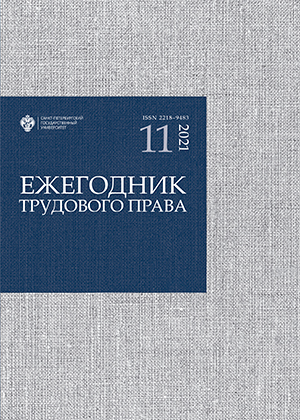Labor discipline and the limits of the employer’s economic power
Abstract
Workplace discipline is supported by the employer with various means of exercising his economic power; in this sense it’s the obvious condition of the effectiveness of both individual and collective labor. Providing workplace discipline by means of economic power, the employer exercises it within certain limits. Those limits are set by the state authority. They are determined mainly by the aims of labour and employment legislation, provided in the norms of the General Part of the Russian Labor Code. The aims are establishment of state guarantees of labor rights and freedoms of citizens, creation of favorable working conditions, protection of the rights and interests of employees and employers. The main task of employment legislation is creation of legal conditions for achieving optimal balance of the interests of the parties of employment relations. Despite the fact that the employee is actually an economically weaker side of labor relations, the public nature of labor law and legislation makes it possible to guarantee the observance of all the rights of a citizen who is a subject of hired labor and thus in case of a conflict can expect the state protection. The employer, on the other hand, is limited in public law means of protecting his interests and therefore has to apply his economic power. In this regard, the analysis of the limits of its lawful application is of particular importance. The article reflects some issues that urgently require their discussion and solution in relation to the problem of labor discipline and the limits of economic power, in particular, the principles of disciplinary responsibility, as well as the employer’s right (not the obligation) to impose disciplinary action on the employee. The article also analyzes the issues of disciplinary liability in case of non-standard forms of employment of hired labor, including in remote work and telemediated work, as well as in relation to employees sent to the employer under the personnel lease agreements.
Keywords:
legal regulation in the field of labor, wage labor, economic power, labor discipline, disciplinary responsibility, distance labor
Downloads
References
References
Downloads
Published
How to Cite
Issue
Section
License
Articles of "Russian Journal of Labour & Law" are open access distributed under the terms of the License Agreement with Saint Petersburg State University, which permits to the authors unrestricted distribution and self-archiving free of charge.




